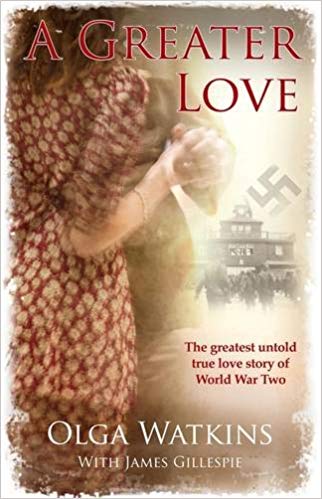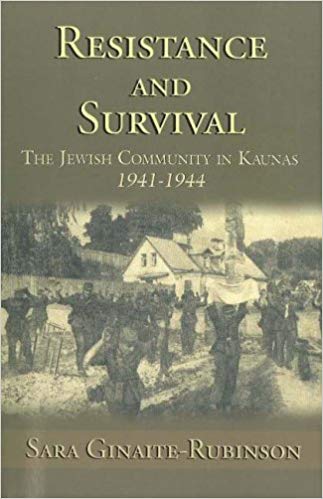The second talk I attended at the Henley Literary Festival was given by Agnes Grunwald Spier – one of the youngest survivors of the Holocaust. Agnes has just published a book called ‘Women and the Holocaust: In Their Own Words’.
In 1944, two years after her parents married, Hungary was invaded by the Nazis. Within months, Agnes’s maternal grandfather had disappeared, last seen on a bus stopped by Nazis searching for Jews (years later, the family discovered he had been murdered in the Auschwitz gas chambers).
In the meantime, Agnes’s father was taken away by Hungarian fascists responsible for implementing anti-Jewish legislation. Sent to the Russian Front, he undertook forced labour. Her mother was left alone in Budapest, “surrounded by women, elderly people and children”. Pregnant with Agnes, she moved into ‘alternative housing’.
Somehow, Agnes and her mother survived the war and the Budapest ghetto, Agnes’s mother valiantly continuing to breastfeed her, despite the scarcity of food. After Budapest was liberated and Russian soldiers were marauding around the city, this formidable woman stood up to them and they left her alone. In a final miracle, Agnes’s father returned home from the Russian front, physically intact but deeply embittered by his experiences. Tragically, he committed suicide ten years later.
World War II might have ended in 1945, but anti-Semitism continued to be rife across Hungary and Agnes’s parents were desperate to leave. In 1946, now living in a displaced persons’ camp in Vienna, having travelled illegally to Austria, one of Agnes’s aunt acted as a guarantor and the family joined her in England.

Agnes grew up here, married and had three children – and, she says, for most of her life deliberately avoided all books, TV programmes and films about the Holocaust. However, when she reached her mid-50s, she realised she was unable to answer any of her sons’ questions about her family background. Stung, she studied for a Master’s in Holocaust Studies, during which she became particularly interested in ‘rescuers’ and their acts of bravery.
Agnes’s research led her to publish her first book, aged 65, called ‘The Other Schindlers’, followed by ‘Who Betrayed the Jews?’ She then decided to write a book specifically about women. This puzzled some of her family, with Agnes’s middle son, Ben, pointing out that both genders experienced dreadful suffering during the Holocaust. That is true, is Agnes’s response – but women had a dreadful time in a different way from men.
‘Women’s Experiences in the Holocaust’ profiles 70 women who lived through this shameful period in history, several of whom Agnes talked to us about today, emphasising how her mother’s experiences helped her to write this book.
Olga Czepf
Unlike most of the women featured in the book, Olga was not Jewish – and nor was her husband Julius, who she met aged 18. However, in October 1943 Julius was arrested for “political” reasons –and promptly disappeared, leaving Olga to embark upon a 2,000 mile search for him around Nazi-occupied Europe.
In Budapest, Olga herself was arrested and interrogated; released, she discovered Julius was in Dachau concentration camp – to where, a fearless Olga travelled and was offered a job with accommodation.
Olga’s book, ‘A Greater Love’, provides one of the few descriptions of concentration camps not provided either by Jews or by Nazis. In it, Olga describes how bizarrely normal the Dachau staff’s lives were. Against a backdrop of daily executions, medical experiments, malnutrition and fear, they were well looked after, lunching with SS officers and enjoying good food(which, after years of rationing, she found herself unable to eat).

One day, Olga was taken into the equivalent of a department store full of beautiful items and offered anything she wanted. Realising, to her horror, that they had belonged to gassed Jews, she declined – to the undisguised shock of the SS officer accompanying her.
In due course, Olga found out that Julius had been transferred to a different camp and tracked him down – finding him nearly dead from typhus. After the war, the couple married, but eventually separated. Olga lived to the ripe old age of 93, continuing to tell Julius’s story, determined that his suffering would never be forgotten.
Sara Ginaite
The author of ‘Resistance and Survival’, Sara and her husband joined the Lithuanian partisans in 1943, when they were in their early 20s, helping people to escape from the Kovno Ghetto and participating in the 1944 liberation of the ghettos in Vilnius and Kaunas.
In her book, which sounds riveting, Sara describes their lives, hiding in forests and constantly on the run. Interestingly, the female partisans were, in most ways, treated as equals– but were still expected to perform traditionally female chores, such as cooking.

Unlike most of her family, Sara survived the war, going on to become a professor of economics. In later life, after her husband died, she moved to Canada.
I highly recommend reading her 2013 paper about the beginning of the Holocaust in Lithuania: http://cjs.utoronto.ca/sites/default/files/uploads/attachments/history_and_personal_memory_-_dr_sara_ginaite.pdf
Norma Falk
The final example Agnes shared with us was that of Norma Falk, who worked as a Red Cross nurse during the war and against her father’s counsel. Sent to the Belsen war trials, Norma was entrusted with the medical care of defendants including Irma Grese and the infamous ‘Beast of Belsen’, Josef Kramer. Norma would speak in later life of the irony of having to provide aspirins to the defendants when they complained of feeling unwell.

Norma, who went on to marry an English doctor, is still alive today and lives in London.
Agnes’s talk had a sobering impact upon a packed auditorium. Yet, although much of it made for uncomfortable listening, how thankful we should be that Agnes and the last remaining Holocaust survivors continue to tell their stories, demanding – clamouring for – our attention. Books such as Agnes’s should be required reading for everyone over the age of ten; how could we ever live with ourselves, should history be allowed to repeat itself?

It’s so important that these stories be told — not only those of the people who suffered but also those brave enough to stand up to racism, brutality, anti-Semitism and every atrocity committed in the name of “purification” and “ideals”… stories that remain horribly relevant today.
In an era when anti-Semitism and bigotry are on the rise and becoming increasingly “acceptable”, institutionalized, and an excuse to marginalize those who are different — labeling them a “threat”– we all need to celebrate our common humanity, not the superficial attributes that supposedly divide us.
Thank you for posting this!
LikeLike
I agree completely: the world seems to be becoming ever more intolerant, everywhere you look (and our politicians are doing precious little to unite us). On the subject of the Holocaust, I’m about to start reading ‘The Tattooist of Auschwitz’: have you read it? A number of people have recommended this book to me.
LikeLike